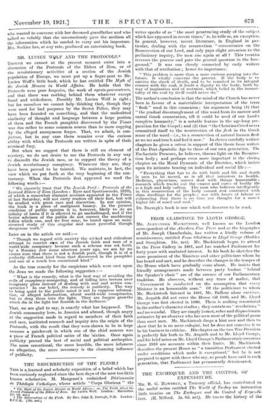THE RESURRECTION OF THE FLESH.t Teas is &learned and scholarly
exposition of a belief which has been curiously neglected since the best days of the now too little known scholastics. M. Mangenot's unfinished Dictionnaire de Thdologie Catholique, whose article "Corps Glorieux " the
• The sriss of the Jeurith Menace in World Affairs ; or, The Truth About the For7ed Protocols of the Elders of Zion. By Lucien Wolf. London : Macmillan. [24. 134.. net.] t The Resurrection of the rah. By Rey. John T. Darragh, D.D. London : .r.c.K. [185. rtes.)
writer speaks of as "the most penetrating study of the subject which has appeared in recent times," is, he tells us, an exception. In general, however, recent literature, in England in par- ticular, dealing with the resurrection " concentrates on the Resurrection of our Lord, and only pays slight attention to the preliminary inquiry, Do men rise again at all ? This treatise reverses the process and puts the general question in the fore- ground." It was one closely connected by early writers with that of retribution ; hence its importance.
" This problem is more than a mere curious peeping into the future. It vitally concerns the present. if the body is to survive the shock of death, and to be reunited in its integral essence with the soul, it lends a dignity to the body, both by way of inspiration and of restraint, winch belief in the inunor- tahty of the soul by itself could never do."
The author's conclusion is that the mind of the Church has never been in favour of a materialistic interpretation of the terns " flesh " used in this connexion ; his argument being (1) that " the gradual disentanglement of this word from its narrow and carnal Greek connotation, till it could be used of our Lord's complete humanity," is a notable feature in the age-long pre- paration for the Gospel ; and (2) that "the Christian Creed never
committed itself to the resurrection of the flesh in the Greek sense of the word—i.e., to a resurrection of natural human flesh as we see and touch and feel it now." In eleven carefully written chapters he gives a calms, in support of this thesis from writers of the Post-Apostolic Age to those of our own generation. The Eucharistic Presence, he believes, throws light on the Resurrec- tion body ; and perhaps even more important is the closing chapter on the Moral Dynamic of the Doctrine, which insists upon its intimate bearing on individual and social life:— "Everything that has to do with birth and life and death is seen to be sacred, as is all that ministers to health. Medicine, physicians, nurses deal with things honourable research which tracks out the causes and cures of bodily ills is a high and holy calling. The man who believes intelligently in this resurrection of the body cannot rest contented with slum dwellings for the people ; nor with hours of labour so exhausting that there is no time nor thought for a man's higher life of mind and soul."
Dr. Darragh's book is one which well deserves to be read.






































 Previous page
Previous page